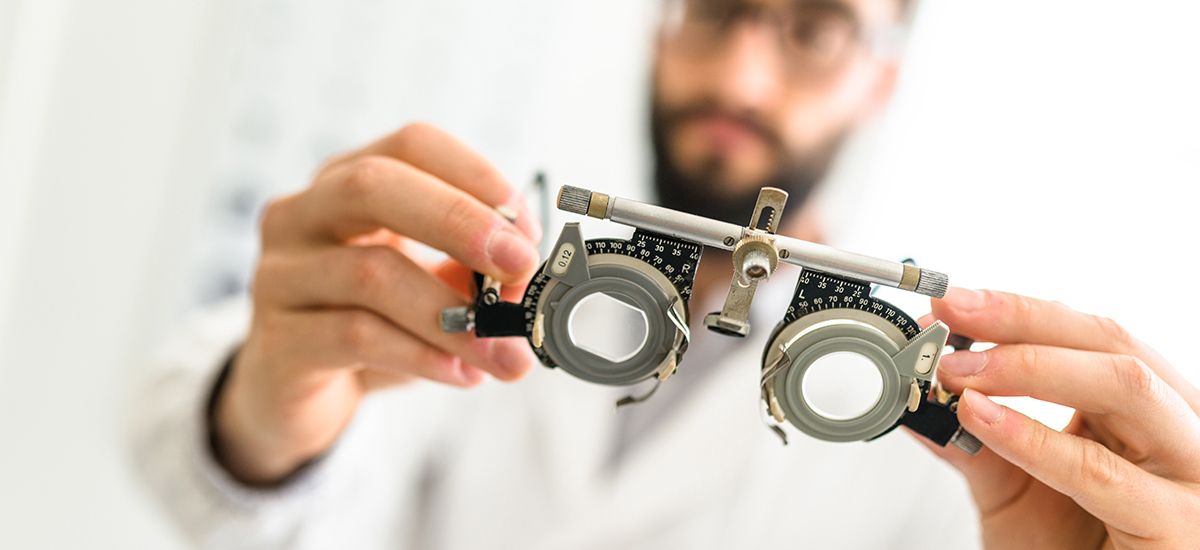When Do You Need to Get an Eye Exam?

We all know that your vision is integral to your overall health, which is why it’s important to get an annual eye exam. A comprehensive eye exam can help you feel more confident by pinpointing any signs that vision correction may be needed.
The question is: do you know when to get an eye exam?
How You Know When to Get an Eye Exam
Regardless of whether you work in an office or outside, you may experience issues with your vision. Sometimes, these issues may warrant corrective glasses or contact lenses. An optometrist can help determine whether a prescription would benefit you, but it’s best to understand the symptoms of deteriorating vision to stay on top of your eye health.
Here are the signs that vision correction may be needed:
#1: You’re experiencing digital eye strain.
Looking at digital devises for extended periods of time make you susceptible to computer vision syndrome, which can cause blurry vision, digital eye strain, and headaches. You’re more likely to experience these symptoms if you work in the wrong lighting. For instance, your light should always be dimmer than your computer monitor.
Sitting too close to the screen can also give you digital eye strain. Your eyes should be at least 20 inches away from the monitor at all times to keep your symptoms at bay. Staying the proper distance away from the screen will also take the pressure off your eyes.
If you’re experiencing computer vision syndrome symptoms, an eye exam is a great way to find out if you need glasses. Many office workers and students opt for blue-light glasses to limit their exposure to blue light. During your eye exam, you can ask your optometrist if these glasses would be right for you.
#2: Your eyes are extra sensitive to light.
Light sensitivity can indicate an eye health concern or prompt your optometrist to set you up with glasses.
During the exam, the optometrist may conduct a variety of tests, including a pupil test, in which they will flash a light in each of your eyes to monitor how you respond.
#3: You think your prescription has changed.
You know when to get an eye exam if you feel like your glasses or contact lenses aren’t working the way they used to. Your vision can change over time. We suggest getting an annual eye exam to ensure your prescription is up to date. The optometrist can also make other recommendations to help you maintain healthy vision.
In addition to the pupil test to assess your eyes’ light sensitivity, the optometrist will perform eye movement and vision tests. These tests will allow the optometrist to see if your peripheral vision or depth perception has changed. If they have, the optometrist will issue new prescription glasses or contact lenses.
#4: It’s been over a year since your last eye exam.
Has it been over a year since your last eye exam? If so, that is a good indicator that it's time to schedule an appointment. Adults and children of school age should have their eyes checked every year to keep prescriptions current and check for early signs of eye issues.
The optometrist will talk with you about your concerns, analyze your current prescription, assess your overall eye health, and examine your eyes. They will also check for farsightedness, nearsightedness, and other eye conditions. By detecting these conditions earlier, the optometrist can take steps to make treatment more successful.
#5: Your family has a history of eye conditions.
If anyone in your family has an eye condition, you may be more likely to inherit it, so an annual eye exam is necessary. These conditions can also pass on to your children. For Eyes offers comprehensive eye exams for children because regularly scheduled eye exams are vital to your child’s development and overall health.
If you think your child may need an eye exam, consider whether they’ve been having trouble reading or completing other activities at close range, if they’ve been complaining of headaches, or if they’ve been closing one eye to watch TV. If they have any of these symptoms, or a family history of a specific eye condition, schedule an eye exam. It won’t take long, and it will be well worth it.
What should you bring to your eye exam?
Besides yourself, you’ll want to bring a list of your current prescriptions and a copy of your vision insurance to your eye exam. That’s it!
To be extra prepared, feel free to make a list of your concerns, so you and the optometrist can discuss them. The optometrist will be able to assist with any questions you may have.
Summary: When to Get an Eye Exam
If you experience digital eye strain or light sensitivity, it is the time when you need to get an eye exam. You should also go to the eye doctor if any of the following applies to you:
- Your corrective lenses don’t feel like they’re working anymore.
- You haven’t had an eye exam in over a year.
- You have a family history of eye conditions.
Book your eye exam at For Eyes
Have you had your annual comprehensive eye exam? Schedule an appointment with an Independent Doctor of Optometry at your local For Eyes.







